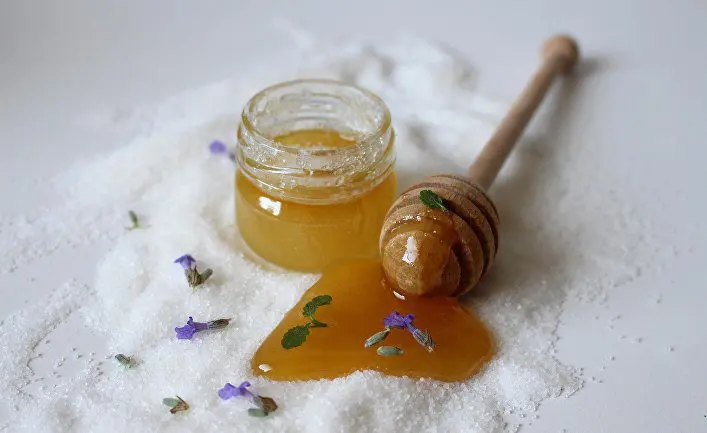Is honey different from sugar in composition? Where are the most calories? What is their glycemic index? How much honey can you eat a day without harm to your health? What are its benefits?
According to a study by scientists from the University of Arizona (USA), honey and sugar are carbohydrates and high-calorie sweeteners.
Is honey different from sugar in composition?
Honey and sugar are mainly composed of a mixture of glucose and fructose. Sugar beets or cane contain sucrose, which is formed from glucose and fructose. Sucrose is the most common sugar. It is also called table sugar.
In honey, fructose and glucose are independent of each other. In addition, about 25 types of oligosaccharides – sugars containing from 3 to 10 monosaccharides were found in its composition.
Where are the most calories in sugar or honey?
One tablespoon of granulated white sugar has 49 calories and one tablespoon of honey has 68 calories.
What effect do they have on the digestive system?
Honey and sugar are absorbed differently by the body due to the difference in enzymes.
Sugar (sucrose) is not digested in the stomach. Gastric enzymes cannot break down sucrose, which is a disaccharide. Digestion only begins in the small intestine. Further, the liver produces enzymes for the formation of glucose, which then enters the blood.
Honey differs in that bees add enzymes to nectar that break down sucrose into simple sugars – fructose and glucose. These sugars are easier for our body to absorb.
Glycemic index of honey and sugar
The glycemic index is a relative measure of the effect of carbohydrates in food on changes in blood sugar levels.
Foods with a low glycemic index slightly increase blood sugar levels, while foods with a high glycemic index, on the contrary.
The average glycemic index of honey is 55 ± 5.
The average glycemic index of sugar is 68 ± 5.
Takeaway: Honey has a lower glycemic index than sugar.
What are the benefits of honey
Honey is rich in antioxidants – flavonoids that have anti-inflammatory properties.
Honey, although in small quantities, contains vitamins and minerals.
It also has antimicrobial properties, relieves coughs and sore throat.
What harm can honey do?
Honey is a high-calorie product. Regular consumption of honey increases the risk of tooth decay and diabetes.
Honey should not be given to infants under one year of age, as it may contain the bacteria Clostridium botulinum, which in the process of life produce a toxin that can poison the body. After one year, the digestive system is mature enough to fight these bacteria.
White sugar contains fewer calories than honey. But it also increases the risk of tooth decay. In addition, sugar is more difficult for the body to digest as it lacks enzymes.
How much honey can you eat a day without harm to your health?
Russian news agency asked experts how much honey can be eaten without harm to health. In their opinion, in order not to harm your body, you should eat no more than two tablespoons a day.
“It is better to use it in the morning and at the same time to lead an active lifestyle,” – said Professor of the Department of Polyclinic Therapy at Sechenov University, Doctor of Medical Sciences Alexei Bueverov.
Bueverov noted that honey contains antioxidants that prevent cell oxidation, vitamins and fructose, which serve as a source of energy.
Experts agree: when choosing, you should give preference to honey in combs, as this definitely guarantees its quality and naturalness.
How much sugar can you eat a day without harm to your health?
The World Health Organization (WHO) states that free sugars should make up less than 10% of total energy intake, which is equivalent to 50 grams (or 12 teaspoons without top) per person of normal weight, consuming about 2,000 calories per day, but ideally, in order to provide additional health benefits, they should make up less than 5% of the total energy consumed, that is, 6 teaspoons without the top.
Free sugars are all sugars added to food or beverages by the manufacturer, chef or consumer, as well as sugars naturally present in honey, syrups, fruit juices and their concentrates. In other words, the sugar in honey is considered free sugar and must be subtracted from the total sugar consumed when consumed.







